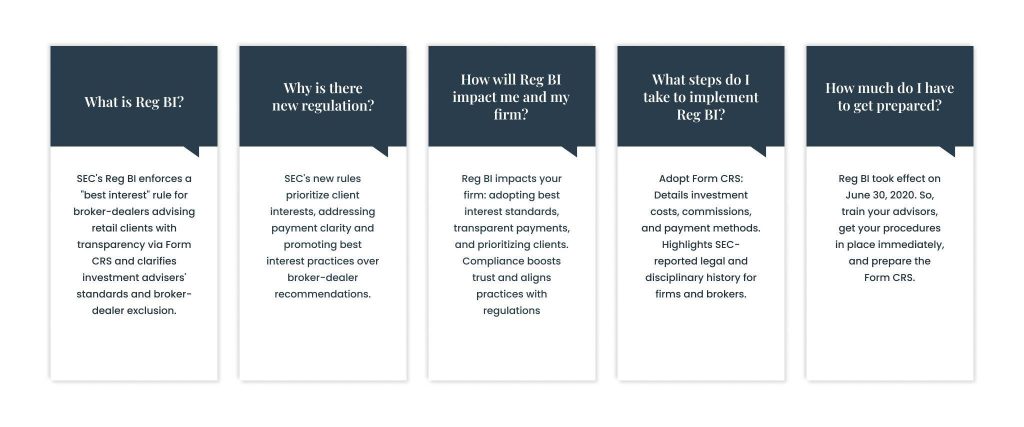
On June 5, 2019, the U.S. Securities and Exchange Commission (SEC) introduced Regulation Best Interest (Reg BI) under the Securities Exchange Act of 1934. The regulation was initially proposed on April 18, 2018. However, it came into effect on June 30, 2020.
What is Reg BI?
SEC Reg BI under the Securities Exchange Act of 1934 establishes a “best interest” standard of conduct for broker-dealers and associated persons. This rule comes into play when broker-dealers recommend any securities transaction or investment strategy to a retail customer. Aimed to enhance the broker-dealer standard of conduct beyond existing suitability obligations, Reg BI intends to ensure that broker-dealers may not put their financial interests ahead of the interests of a retail customer while making investment recommendations.
For documentation purposes, the SEC mandated broker-dealers and investment advisors to furnish a client relationship summary or Form CRS to their clients in order to provide information on fees, costs, conflicts of interest and standard of conduct associated with client-broker-dealer relationships.
What Are The Key Obligations of SEC Regulation Best Interest?
Four specific obligations of Reg BI must be met by broker-dealers.
Disclosure – Broker-dealers are required to disclose all relevant data regarding an investment suggestion and to describe the parameters of their connection with you, the client, in writing.
Care – Broker-dealers must make all investment recommendations with reasonable diligence, care, and skill.
Conflicts of interest – Broker-dealers must declare all conflicts of interest in advance.
Compliance – Broker-dealers must adopt and implement documented policies and processes to ensure compliance with Reg BI.
What Is Required under Reg BI?
Under Reg BI, broker-dealer have to:
- Prioritize client’s best interests when presenting investment recommendations.
- Avoid prioritizing personal financial interests over clients’.
- Uncover conflicts of interest through established operational processes that reveal significant details about potential conflicts.
- Take appropriate steps to manage conflicts of interest when mere disclosure is inadequate.

Why Is SEC Reg BI Becoming So Important?
It elevates financial interests: The core purpose of Reg BI revolves around safeguarding investors’ financial welfare. This regulation prioritizes the well-being of individual investors, ensuring that their financial interests supersede the personal gains of broker-dealers.
It amplifies investment transparency: The significance of Reg BI lies in its capacity to enhance investment transparency. By imposing comprehensive disclosure mandates, the regulation establishes a heightened level of transparency, specifically pertaining to investment recommendations provided by broker-dealers.
It enables equitable market competition: A key driving force behind the increasing importance of Reg BI is its role in fostering fair market competition. The enhanced transparency requirements for broker-dealers contribute fair competition within the marketplace for bias-free broker-dealer service.
What Are The Complexities with Regulation Best Interest Compliance?
- Reg BI’s subjectivity: Reg BI mandates that broker-dealers act in the best interest of retail clients when recommending securities transactions. However, defining what constitutes the “best interest” is a multifaceted term. Firms must establish comprehensive policies and procedures to ensure compliance while grappling with the complexities of aligning recommendations with clients’ specific financial needs and risk tolerances.
- Rigorous documentation and record-keeping: Reg BI necessitates rigorous documentation of the reasoning behind investment recommendations and the steps taken to eliminate any conflicts of interest. This requirement poses significant challenges, as maintaining accurate and detailed records can be laborious and resource-intensive. Firms need to strike a balance between comprehensive documentation and operational efficiency. It also requires brokers to detect potential conflicts of interest, although not all conflicts are mandatory to resolve.
- Ambiguity surrounding ‘Conflicts of Interest’ disclosure: Identifying and addressing conflicts of interest is a central aspect of Reg BI. Broker-dealers must implement robust measures to mitigate conflicts that could compromise the best interests of clients. It may be difficult for investors to read complex disclosure papers. This calls for the need to design effective disclosure mechanisms that provide clients with transparent information about potential conflicts, all along ensuring that these disclosures do not overwhelm or confuse investors.
- Costs associated with a financial advisory: Reg BI makes financial advice so expensive. So, broker-dealers may pass the charges associated with Reg BI on to their clients.
- Cross-jurisdictional compliance: Operating in a global market introduces the challenge of cross-jurisdictional compliance. Firms engaging with clients across different regions must reconcile Reg BI requirements with other local and international regulations. This demands a comprehensive understanding of the legal landscape and a strategy to harmonize compliance efforts.
Finally,
In a bold move towards transparency and investor empowerment, SEC’s’s Reg BI is a step in the right direction for stepping up the need for accountability and responsible financial advisory.
By prioritizing investor well-being, SEC Reg BI urges financial firms and broker-dealers to set up systems supported by meticulous documentation, adequate conflict resolution mechanisms, training, and technological innovation to stay ahead of competition. For further reading on how to better prepare for Reg BI compliance and stay relevant in today’s complex regulatory landscape, click here.


